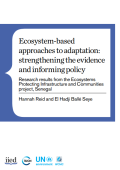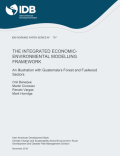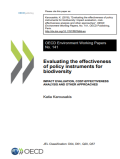
This report presents the findings from a literature review and interviews with a wide variety of stakeholders of the Ecosystem-based approaches to adaptation: strengthening the evidence and informing policy project activities in Djilor District in Senegal. EbA measures in this project site include the construction of anti-salt bunds, nursery establishment, applying assisted natural regeneration techniques, reforestation, introducing new roosters, vegetable gardening and establishing mechanisms for regulating the exploitation of natural resources. The report concludes that the project activities have improved the resilience of local communities, improved their adaptive capacity and reduced their vulnerability, with the benefits being felt by a range of social groups and a number of social co-benefits also emerging.
Many of the world’s vital natural ecosystems, and the communities reliant on them, are vulnerable to climate change, yet ecosystems themselves can form a strong line of defense against the direct impacts of climate change. This paper argues that nature-based solutions are a key tool for meeting global goals on climate change and sustainable development.
This paper argues that by collaborating with other private sector partners and with public sector bodies, businesses can significantly increase their impact. It reviews different types of business and investor actions on climate, and highlights areas in which international cooperation has the potential to enhance ambition and lead to greater impact and accountability.

This paper develops and operationalises the Integrated Economic-Environmental Modelling (IEEM) platform, which integrates environmental data organised under the first international standard for environmental-economic accounting with a powerful economy-wide modelling approach.

This report provides an overview of methodologies to evaluate the effectiveness of policy instruments for biodiversity, covering impact evaluation, cost-effectiveness analysis, and other approaches. It then provides an inventory of biodiversity-relevant impact evaluation studies, across both terrestrial and marine ecosystems. The report concludes with lessons learned, policy insights, and suggestions for further work.
